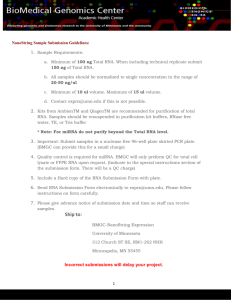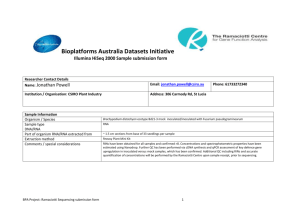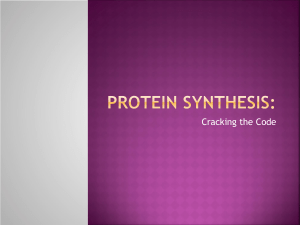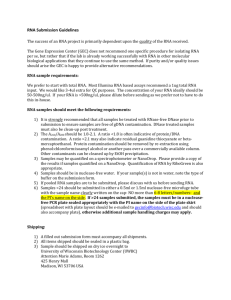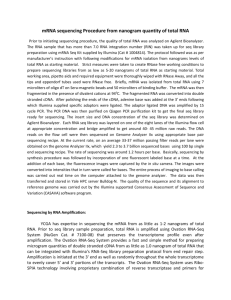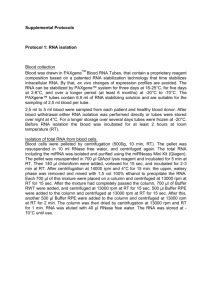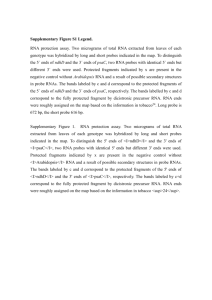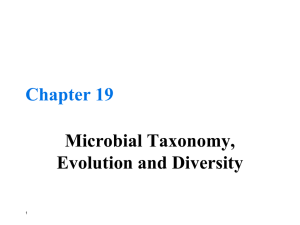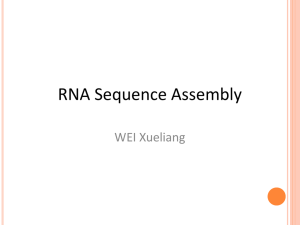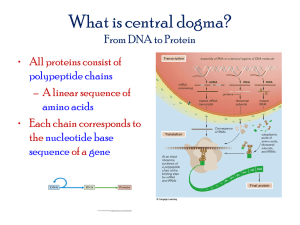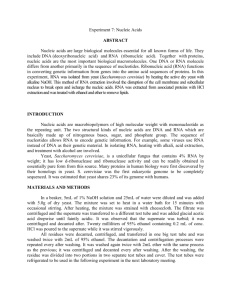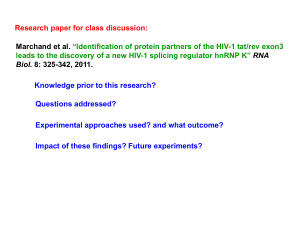Bioplatforms Australia Datasets Initiative IlluminaHiSeq 2000
advertisement
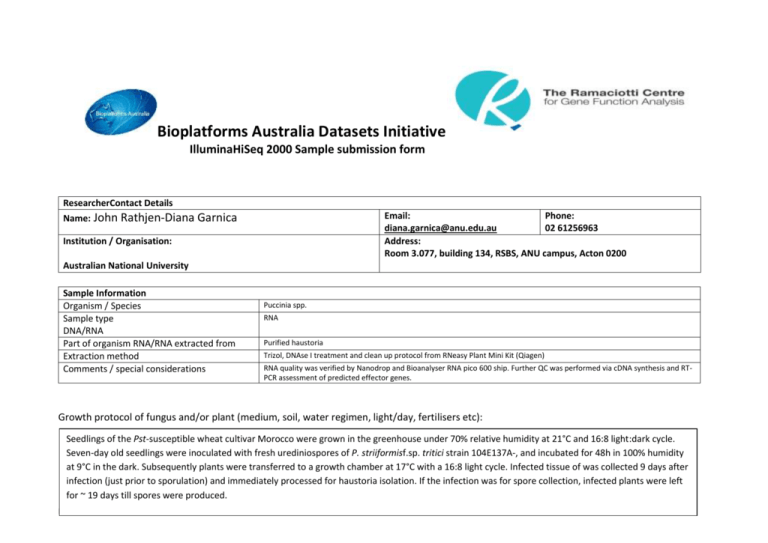
Bioplatforms Australia Datasets Initiative IlluminaHiSeq 2000 Sample submission form ResearcherContact Details Email: Phone: diana.garnica@anu.edu.au 02 61256963 Address: Room 3.077, building 134, RSBS, ANU campus, Acton 0200 Name: John Rathjen-Diana Garnica Institution / Organisation: Australian National University Sample Information Organism / Species Sample type DNA/RNA Part of organism RNA/RNA extracted from Extraction method Comments / special considerations Puccinia spp. RNA Purified haustoria Trizol, DNAse I treatment and clean up protocol from RNeasy Plant Mini Kit (Qiagen) RNA quality was verified by Nanodrop and Bioanalyser RNA pico 600 ship. Further QC was performed via cDNA synthesis and RTPCR assessment of predicted effector genes. Growth protocol of fungus and/or plant (medium, soil, water regimen, light/day, fertilisers etc): Seedlings of the Pst-susceptible wheat cultivar Morocco were grown in the greenhouse under 70% relative humidity at 21°C and 16:8 light:dark cycle. Seven-day old seedlings were inoculated with fresh urediniospores of P. striiformisf.sp. tritici strain 104E137A-, and incubated for 48h in 100% humidity at 9°C in the dark. Subsequently plants were transferred to a growth chamber at 17°C with a 16:8 light cycle. Infected tissue of was collected 9 days after infection (just prior to sporulation) and immediately processed for haustoria isolation. If the infection was for spore collection, infected plants were left for ~ 19 days till spores were produced. BPA Project: Ramaciotti Sequencing submission form 1 Treatment protocol (i.e. route of administration of pathogen): Explained in previous section. Further Information on experimental design (i.e. timepoints and biological replicates): Haustoria were purified by a Percoll gradient method. Twenty g of infected wheat leaves were treated as above, but after passing through the 20 µm mesh, thefiltratewas centrifuged at 1080 g for 15 min at 4°C and the resulting pellet was resuspended in 20 ml of 1x isolation buffer [0.2 M sucrose, 20mM MOPS pH 7.2] containing 30% Percoll. The suspension was divided into four tubes and centrifuged at 25,000 g for 30 min at 4°C. The first 10 ml of each tube was recovered, diluted 10 times with 1x isolation buffer and centrifuged at 1080 g for 15 min at 4°C. The pellets were resuspended in 20 ml of 1x isolation buffer containing 25% Percoll and centrifuged at 25,000 g for 30 min at 4°C. The first 10 ml of each tube was recovered, diluted 10 times with 1x isolation buffer and centrifuged at 1080 g for 15 min at 4°C. The final pellet was frozen in liquid nitrogen and stored at -80°C prior to RNA isolation. Three biological replicates were sent for sequencing. Germinated urediniospores were obtained by germination of about 80 mg of fresh spores harvested from infected leaves 17 daion sterile distilled waterat 9°C for 15 h in the dark.Germinated urediniospores were collected by filtrationwith an 11 μm nylon mesh, and frozen in liquid nitrogen and stored at -80 prior to extraction of total RNA.Three biological replicates were sent for sequencing BPA Project: Ramaciotti Sequencing submission form 2 Sample Name Volume (ul) RIN (RNA) OD 260/280 OD 260/230 Conc.(ng/ul) Additional Information. (method used) Sample 1 Pst 104E137A- sample 1 30 >200 Sample 2 Pst 104E137A- sample 2 30 >200 Sample 3 Pst 104E137A- sample 3 30 >200 Sent 4-30-12 Sample 4 Spores1 50 >200 Sent 4-30-12 Sample 5 Spores2 50 >200 Sent 4-30-12 Sample 6 Spores3 50 >200 Sent 4-30-12 Sample 6 Sample 7 Sample 8 Sample 9 Sample 10 Sample 11 Sample 12 Attach additional sheet if more samples BPA Project: Ramaciotti Sequencing submission form 3 Sample Requirements RNA • • • Samples should be intact and not degraded as assessed by a Bioanalyzer. The RNA Integrity Number (RIN) value should be greater than 8. OD 260/280 ratio of 2, and a 260/230 of 1.8-2. 5 μg of total RNA at min concentration of 200ng/ul (optimal 500ng/ul). The concentration should be measured using the Ribogreen fluorescent assay. Samples should be resuspended in nuclease-free water or elution buffer. RNA that has been extracted using Trizol or any phenol based method must undergo an additional column purification • • Sample shipment details Samples to be shipped on dry ice. Facility The Ramaciotti Centre Address Lowy Cancer Research Centre C25 via Gate 11 Botany Street University of New South Wales Randwick, NSW 2052 Contact person Tonia Russell Phone: (02) 93851658 Email: illumina@unsw.edu.au Please email a copy of the completed form to Anna Fitzgerald (afitzgerald@bioplatforms.com) at the time of sample submission and complete Google Docs metadata form. BPA Project: Ramaciotti Sequencing submission form 4
